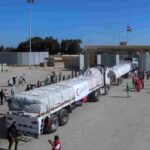“Freeports represent a significant threat to the well-being of Britain” – Richard Murphy, tax expert and political economist.
“I think that for the most part, these zones are used quite candidly by political leaders to create areas of unaccountability or to accelerate economic activity for their own interests” – Quinn Slobodian, author of Crack Up Capitalism: Market Radicals and the Dream of a World Without Democracy.
Freeports: complex entities carving up the UK for corporations
Freeports and Special Economic Zones (SEZ) are variations on the same thing: deregulation, privatisation, tax evasion, and corporate governance.
Freeports and SEZs are complex entities. Complexity is their camouflage, and we must understand what they are, because they are carving up the UK into regions where corporations are protected from parliamentary and public scrutiny under secondary legislation.
A Freeport is privately owned, whereas a port is publicly owned.
Ports are traditionally used for container freight transhipment operations. Freight comes into a port area, and it is stored and/or processed before being re-exported. However, a Freeport can also be a warehouse, an inland location, or an airport.
Freeports carve out sections of the country by establishing a border around them. Within that border, companies have exceptional legal status, distinct from the rules and regulations applied to their surroundings.
Goods going into a Freeport are not subject to customs and tariff duties. After US president Donald Trump’s latest global tariff attacks, this begs the question, will the UK’s 12 free ports be exempt from Trump’s tariffs when exporting goods to the US?
BlackRock’s fingerprints all over Freeports, naturally
Blackrock has bought three British Freeports. In partnership with Terminal Investment Limited (TiL), a subsidiary of the shipping line MSC, it has acquired an 80% stake in Felixstowe, Harwich, and Thamesport, as part of a larger $22.8 billion deal with CK Hutchison.
This transaction, announced in early March 2025, involves Hutchison Port Holdings, which includes 43 ports across 23 countries. The deal encompasses the UK’s Port of Felixstowe, the country’s primary container hub, along with Harwich and Thamesport, as well as significant terminal operations in Europe, such as Rotterdam.
The agreement was finalised with an expected signing date of 2 April 2025, transferring control of these key UK freeports to the BlackRock-TiL consortium. This move has been noted in trade and freight industry reports, though broader mainstream media coverage has been limited as of the current date, 7 April 2025.
Freeports: the playgrounds of predatory capitalism
Freeports are bad news for the UK. They are playgrounds for predatory corporations, which are free to indulge in all manner of illegal and illicit activity, such as modern-day slavery, private banking, fraud, the suspension of corporate taxes and custom duties, discarding environmental protections, erosion of worker’s rights, the smuggling of weapons, drugs, and people, hoarding of stolen art, installation of private security forces, extreme worker surveillance, acceleration of land-grabbing, and the trashing of regulations in favour of all-out deregulatory frameworks.
Freeports are tax havens; they contribute nothing to local communities, they thrive on extraction of public wealth and resources, and have to be maintained at astronomical cost to the taxpayer.
The RMT and TUC have stated they are both opposed to Freeports because they threaten worker’s rights. However, I have yet to see any follow-up from trade unions as the UK’s 12 Freeports and 74 SEZs rapidly become operational.
There is no evidence whatsoever that Freeports contribute to economic growth.
Keir Starmer keeps lying about Freeports and SEZs. One minute they’re terrible, and the next minute they’re a deregulated capitalist paradise for economic growth.
In 2021, Starmer said that:
Freeports are not a ‘silver bullet’ for economic success
Following this, in 2022, he stated:
In recent months the drivers of growth have been hotly debated in the UK. The Conservatives have suggested – with almost all mainstream academic evidence opposing them – that tax cuts and deregulated free ports and investment zones are a critical driver to growth.
Then, once Labour were in office, something odd was announced that contradicted Starmer’s previous position on free zones at the Labour Investment Summit in 2024.
Angela Rayner said:
I am delighted to announce today that we will move forward with two Investment Zones – creating high-quality jobs in advanced manufacturing in the West Midlands and life sciences in West Yorkshire.
More deregulation and more investment zones…
Relaxed regulations mean relaxed enforcement of regulations.
This allows businesses setting up in a Freeport to ‘self-regulate’ and work for their own interests and not those of society in general.
The UK Freeport model is simply extending tax and customs advantages to businesses that are or will be active mainly in serving the domestic UK market.
The free zone is not, and never can be, the local community’s friend. It is not the protector of the environment; it is the destroyer. It is not the source of collective decision-making; it is an authoritarian stifler of the social commons, and it does not have livelihoods or worker’s rights as a priority. Free zones are all about turbo-capitalism, a post-Brexit wrecking ball that will lead to an economic boom for the investor classes, but will absolutely eviscerate and impoverish those entrapped in ‘the zone’.
Did you vote for this?
Freeports are part of a process through which libertarian ideologues are installing a global push to reconfigure nation-states, to reverse and dismantle democracy in the 21st century. The zone is a harbinger of offshoring wealth with no checks and balances, no rights, just raw corporate power.
Free zones are experimental by nature, which, according to US right-wing libertarian Tom Bell: “may or may not work”.
It goes like this: break up a nation, subdivide the land, invite foreign venture capitalists in, and hand over powers of governance to them while reducing elected government oversight.
This means tailoring private laws (as opposed to the often negatively-framed ‘statist’ laws) to corporate demands, legalising the breach of hard-won rights and freedoms.
The benefits of freeports are as illusory as those of Brexit. Take this analysis by the Institute for Fiscal Studies (IFS):
The government and the freeports appear to be much more optimistic: for example, the English freeports themselves expect to create more than 200,000 additional jobs between them. The government has, to date, not published a full assessment of the effects it expects freeports to have, which makes it difficult to scrutinise and evaluate these competing claims.
There are 12 Freeports in the UK:
- Eight in England
- Two in Scotland
- Two in Wales
Each Freeport sits inside a much larger Special Economic Zone (SEZ), of which there are 74 in the UK:
- 48 SEZs in England
- 18 SEZs in Scotland
- Eight SEZs in Wales
In March 2023, first minister of Wales, Mark Drakeford, said:
I am pleased to confirm the Celtic Freeport in Milford Haven and Port Talbot and Anglesey Freeport have been selected as Wales’s new freeports.
Meanwhile, the UK government website states:
Enterprise Zones are a devolved matter and there is no obligation for the devolved administrations to adopt them
The UK’s SEZS range in size from 34km to 75km in diameter:
These are expansionist projects that will magnify the deregulatory framework by applying it to entire regions. This represents a next-level attack on the commons.
Faustian Freeports
Green Freeports are a form of greenwashing. Offshore wind farms were already happening around the UK, so why was Freeport status deemed necessary? This is also part of the myth of Carbon Capture and Storage (CCS), a ploy by the fossil fuel industry to convince people that this (as yet unproven) technology shows their caring face about the inevitable destruction of the planet.
The grift of deregulated SEZs is that they are set up to help developing countries achieve a stable economy and alleviate poverty. State aid (which is public money) is used to kickstart a country’s economy:
The EU has 82 SEZs but these are strictly regulated to stop governments of member states from giving state aid as profit motives to corporations. The European Commission enforces this to ensure a level playing field in the EU’s single market, preventing member states from distorting competition by favouring their own industries.
State aid under World Trade Organization (WTO) rules provides a mechanism for members to challenge them if they harm trade interests, often through dispute settlement or countervailing duties.
Article 107 of the Treaty on the Functioning of the European Union says that if state aid distorts competition or the free market, it is classified by the European Union as illegal state aid.
The UK now has 74 deregulated SEZs plus 12 Freeports initiated by Rishi Sunak and Liz Truss, signed off and fully backed by Keir Starmer’s changed Labour Party.
Brexit ensured that the UK left the EU’s regulatory orbit for a laissez-faire approach to economic growth by installing a corporate political model which allows companies to self-regulate under Adam Smith’s ‘Invisible Hand’. This is crucial to understanding why the UK’s public infrastructure is being absorbed by corporations such as Blackrock who have launched an ‘Infrastructure Imperative’, and are making serious incursions into the public sector.
The neoliberal playbook in a nutshell
On 21 November Keir Starmer casually announced on X a government ‘partnership’ with Blackrock:
During a webinar with 700 corporate lobbyists, Lord Evermore (with Starmer’s backing) told them that “governance powers” were to be handed over to them while the UK government would take a “secondary position”.
This was music to the lobbyist’s ears, as for decades think tanks like the Institute of Economic Affairs (IEA), The Heritage Foundation, Policy Exchange, and the Atlas Network (a right-wing think tank that creates right-wing think tanks) have sought to dismantle big government by breaking it down into more ‘manageable pieces’, and where better to do this than in deregulated free zones?
Free zones carve out regions of a country and set up a deregulatory framework within their boundaries, which is tailored specifically for total corporate hegemony, and in the most extreme cases with separate laws from the host country. These are branded as ‘localised freedoms’.
Devolution in this context is synonymous with deregulation, collective sovereignty (people power) is replaced with corporate sovereignty (the asset classes’ power).
When Starmer, Reeves, and Rayner talk of removing the “regulatory burden, stopping the blockers, and cutting red tape”, they are following the neoliberal playbook to the letter.
Economic growth for the 1%
It should be noted that the UK’s 86 free zones, unlike Thatcher’s SEZs, are now embarking on something they couldn’t do when the UK was an EU member: dishing out public money to their corporate friends to facilitate economic growth for the 1%.
Each Freeport receives £25 million seed capital. That is private investment multiplied by 12, equaling £300m.
Sunak’s flagship Brexit Teesside Freeport has spent £560m of taxpayers’ money, and profit share is split 9/10 in favour of the private sector.
Tees Valley Combined Authority (TVCA), led by Mayor Ben Houchen, has been put into special measures. The government has issued a Best Value Notice (BVN) to the TVCA. The lack of transparency comes as no surprise to anyone who has sent questions to the TVCA. Just last week Mayor Houchen branded the public “idiots” for doing so.
Each SEZ receives £160 million in state aid multiplied by 74, totalling £11.84bn.
A template for UK government corporatisation
The fact that those on benefits, those struggling to live from paycheck to paycheck, those juggling two or more jobs, those facing council tax rises, and astronomical energy bills, will be expunged in the same way that the left were expunged from Starmer’s changed Labour Party is anathema to these neoliberal ghouls.
Public services are deemed ‘small potatoes’ by libertarians, their goal is ‘countrypreneurship’. The UK government, just like the US government, is being hollowed out from within, and it will eventually be replaced with a ‘Sovereign Corporation’.
The UK is going to be privatised and Zone Fever is the template for doing just that.
Featured image via the Canary
























